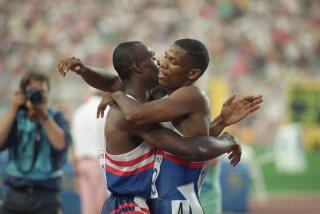Stones, at 32, Still Is Strong of Leg and of Voice
- Share via
It would have been easy to write off Dwight Stones in 1980. At age 26, Stones, a former world-record high jumper and two-time Olympic bronze medalist, was coming off a suspension and the boycott of the 1980 Olympics.
Until then, no high jumper over 25 ever had been ranked in the Top 10. There was talk that Stones’ high-jumping days were numbered.
“It would have been very easy for me to say, ‘That figures. I’m 26 and they say you can’t do it after 25, so I better throw in the towel,’ ” Stones said. “But somebody who pushes a pen or a typewriter really doesn’t impress me as an authority on how long I or anyone else can compete.”
A typical Stones response. Arrogant and cocky. Much like his image at the time. Stones, however, used the media’s criticism as fuel for a fire that brought him an American record and a No. 4 world ranking the next year.
It also renewed Stones’ desire to remain a world-class high jumper, a desire so strong it still pushes him. And while a lot has changed for Stones since then, he remains a major figure in the high jumping world at age 32.
For Stones, the fire still burns. He loves the competition too much to retire. He doesn’t dismiss talk of a possible appearance at the 1988 Olympics, and he will head a field of world-class jumpers Feb. 1 in the Dallas Times Herald Track Meet at Reunion Arena.
Stones will tell you his image has changed since his free-wheeling days in Montreal at the ’76 Olympics, when he was the landslide favorite to win the gold at age 22. But, although his life has changed--he’s married and has two children--Stones hasn’t lost the self-assuredness, confidence and arrogance that built his flamboyant reputation.
“I learned a long time ago that there’s a burnout factor,” he said. “Other guys don’t look at the long haul. It’s a crap shoot. You only have so long. But I know when to back off.”
He has other pursuits now and is realistic about his future as a competitive jumper. He is the oldest world-class high jumper, but Stones knows it can’t last forever. He is planning a career as a track and field television analyst, something he has done part-time since 1977.
“I realize that I’m closer to the end of my high jumping career than I am to the beginning,” Stones said. “And I have to make preparations to enjoy life after track and field because there definitely is life after that.
“I won’t allow myself to be one of these ex-jocks who don’t allow themselves to develop in other areas and live on their past glories.”
Stones’ glory days speak for themselves. He won bronze medals in the ’72 and ’76 Olympics, the first at age 18. He set a world record of 7-7 in 1976, but lost it in 1977 and never has regained it. At 30, he set an American record of 7-8 at the Olympic Trials in ’84.
Stones attributes his success and longevity to his intense competitive nature and ability to avoid injury.
“I decided very young that if I needed to meet and beat everybody everywhere all the time, I would have to train all the time and have that be my No. 1 priority,” Stones said. “And anything that didn’t fit into that scheme simply had to be eliminated.”
Stones’ endeavors have been well-publicized. His cocky attitude made him the Muhammad Ali of track and field, and his outspoken and radical views on his sport have kept him in the limelight.
His controversial suspension in July 1978 spawned a lot of the hype. He had been the first amateur to participate in the Superstars television competition, for which he was paid. Before the event, Stones was told by authorities in the International Amateur Athletic Federation that he could compete if he donated his earnings to the charity of his choice. He donated his earnings to his track club, which sparked debate from the AAU that ended with his suspension.
Stones let the courts arbitrate the situation. In 1978, the Amateur Sports Act was passed, stipulating that one federation could not control more than two sports. The Athletics Congress then took control of track and field.
“Here I am, these are things that I fought for for years, and now they’re going to happen and I’m on the outside looking in,” Stones said. “So I said, ‘OK, I was the first amateur to participate in Superstars so now I’ll be the first amateur to be kicked out and reinstated.’ ”
In the years between the ’72 and 76 Olympics, Stones arguably was the world’s best. In 1976, 112 out of 117 sportswriters voted him as the favorite to win the gold. But it rained on the high-jump competition that year, and Stones, who depended on a quick approach, was thwarted in his bid for the gold.
“I spent the four years between Munich and Montreal setting up that psychological mind-set that when we go to the Olympic Games everybody but me is going to be competing for the silver medal,” Stones said. “And it was working very well, and it would have worked had it not rained. There is no doubt in my mind I would have won the gold.”
Despite that disappointment, Stones set the world record four days later and was ranked No. 1 that year.
Stones kept bouncing back. After his suspension, he was ranked fourth in the world in ‘81, third in ’82 and seventh in ’83 at age 29. That year he won the national championship and placed sixth in the world championship. At the ’84 Olympics, he jumped 7-7 to finish fourth.
How long will it last? Stones said he will compete in masters events after his retirement, but that he has too much going to be thinking about quitting. He is keeping in shape with events such as the Times Herald meet and two weeks of competition in Europe.
Although his television career has stolen some of his concentration, Stones said he can’t be dismissed as a contender for the ’88 Olympics--though he won’t make a commitment.
“My concentration on the event is not 100%,” Stones said. “Let’s face it: I’m jumping against younger athletes who have superior talent. But I want to remain competitive and I’m going to surprise people once in a while. I’m not going to give up the idea of making our Olympic team in ’88. People have been telling me for years it’s time to quit. But don’t write Dwight Stones off until he tells you it’s time.”
More to Read
Go beyond the scoreboard
Get the latest on L.A.'s teams in the daily Sports Report newsletter.
You may occasionally receive promotional content from the Los Angeles Times.






